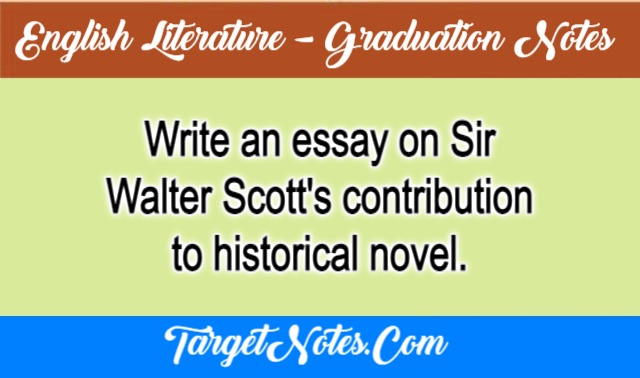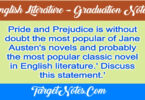
Contents
Write an essay on Sir Walter Scott’s contribution to historical novel.
Historical novel is a narrative, generally of an adventurous nature, in which an historical background, including historical figures, is provided for the deeds of fictitious characters. Scott is perhaps the greatest writer of such stories in English. His novels are called the waverly novels. He wrote his novels on a framework of historical events. In a historical novel the novelist blends historical facts with imagination. Scott’s historical novels are very famous. He is one of the greatest historical novel writers. He wrote more than twenty seven novels. They are called waverly novels.
Historical novel showed the most marked development because of the novels of Scott. He wrote novels with great haste and rapidity. He is called the father of the historical novel. Inspired by the principle of the historical romance, Scott tried to write his historical novel. Scott’s novels known as the waverly novels are twenty seven novels and five tales. Some of his famous novels are -Eleventh Century Count Robert of Paris, The Bethrothed’, The Talisman’, ‘Castle Dangerous’, etc.
His novels are based on some incident of the history of Scottland. ‘Guy Mannering’, The Heart of Midlothean’, ‘The Bride of Lommermoor’, ‘Ivanhoe’, ‘The Abbot’, The Fortunes of Nigel’, and Woodstock are some other famous novels which were published in quick succession.
The notable contribution of Scott to the creation of the historical novel is this that he gave the novel a firm footing in English literature He made it a literary form to instruct and to elevate the mind. It was Walter Scott, the prophesier of things passed, who set the novel on its feet again. He brought to the contemporary interest in the romantic past. His own splendid gifts of imagination developed an almost new genre, through his historical novel. His was the alchemy that transmuted the horrid elements into the pure gold of the creative imagination. He took names and dates from the history primer and transformed them into literature. He made dry bones alive. Like an enchanter he walked through the tombs of time and quickened into life their ghostly inhabitants.
Scott violated chronology. He invented situations, he allowed his imagination free play with the costume, cupboard and the make-up box, but in making the past come alive he was gloriously successful. Scott has described the political influence of religion and the peculiar significance of superstitions and legend in the mind. Scott had a genius for vitalising the past. He was a born story teller. The secret of his marvellous story telling lies in his technique of improvisation. He had a intuitive perception of ‘welding together the past and present in a homogeneous whole and showed us the spiritual continuity of history.
For Scott the past, often by virtue of some chance revelation or contact, ceased to be the past, and became in his consciousness as immediate as the present. From inanimate thing he involuntarily drew life, passion, romantic visions, the actual vibration of events. For him dry-bones re-assembled themselves and became clothed in flesh and rubble reconstituted itself into settings for pageantry.
Utomatically in him the past was re-born, re-animated, re-realised and ceased in any dry-as-dust sense to be history. To present and interpret facts was the historian’s business, to summon up a past epoch, to show men and women alive in it and behaving as they must have behaved in the circumstances was the labour and joy of the genius historical novelist. It is this feeling for the historic past behind the individual that is the clue to Scott’s genius. History is the fourth dimension through which his characters move.
Related Link
- Write a short note on narrative technique of a novel.
- What do you understand by Novel? What are the elements which are to considered in plot construction.
- Define Growth of Post-colonial Literature: Feminism, Post-Modernism & Important Facts
- Define The Poetic Drama & Important Facts
- What is Epic Theatre & its Important Facts?
- What is The Expressionism & Important Facts to Remember?
- What is the Theatre of the Absurd & Important Facts
- Define Drama of Ideas & Important Facts.
- Define The Problem Play & Important Facts.
Disclaimer






